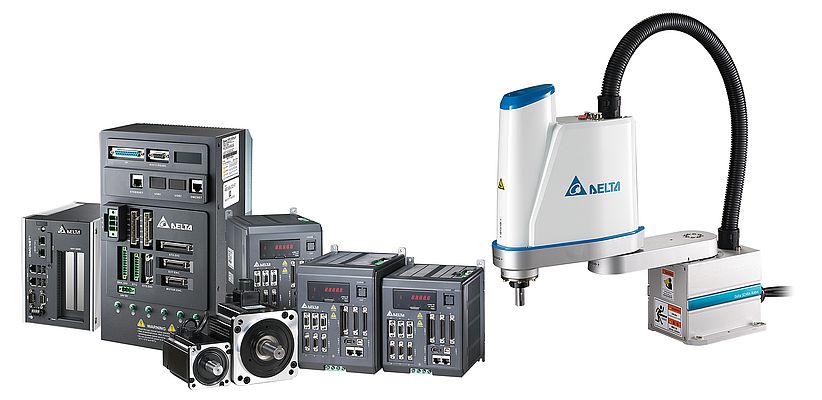IEN Europe: Delta is a major provider of products and solutions for the whole automation process. Can you tell us the latest developments in the automation industry?
Mr. Liu: Our latest and most promising development for factory automation is the SCARA (Selective Compliance Assembly Robot Arm) robot solution. The SCARA robots are very common and widely applied in the automation sector, such as for electronic assembling, food and beverage packaging, rubber and plastic manufacturing, and others. When we look at current markets, especially China, the major challenge for the manufacturing sector is an increasing labour cost with an average 10% growth rate every year. Moreover, production quality is hard to control if there is a substantial amount of labour, which is an issue that has existed for years. In the past, manufacturers put up with a low yield rate for the low labour and material cost in China; but now, the low cost advantage is disappearing with more developing countries in South-East Asia emerging. As a result, most manufacturers are searching for solutions, which points to the massive application of industrial robots. Delta is an electronic products manufacturer, and we require robots in our own production. For the launch of Delta’s new SCARA robot, we deployed it on our production lines in Taiwan and China for “at home” tests before putting it on the market. We learn about customer requirements and product usage know-how at the same time through inhouse application. Besides SCARA robots, we are actually applying our new industrial energy management systems (IEMS) in our factories as well. In 2009, the founder and chairman of Delta, Mr. Bruce Cheng (now honorary chairman), brought in the practice of energy saving and demanded all managers reduce power consumption by 10% in our offices and factories every year. The IABG has consistently achieved this goal since then and we gained a lot of experience in saving energy on production lines. This is very helpful and appealing to our customers.
IEN Europe: The coming world will be more automated and connected
than ever. Which automation and connectivity technologies is Delta working on, in order to achieve the big goal of Industry 4.0?
Mr. Liu: In Industry 4.0, people talk about cyber-physical systems that cover smart manufacturing and the Internet of Things (IoT). Delta will provide essential components such as sensors and robots, and software such as SCADA, to fulfil the needs of smart manufacturing. As Delta has already launched industrial robots, we are now focusing more on sensors and SCADA (for data collection, control and visualization) to build a more complete smart manufacturing solution. In addition, we are integrating our automation solutions with IEMS to construct more energy-efficient, automated solutions for various industries in worldwide markets, including the German market.
IEN Europe: Which industries does Delta serve primarily?
Mr. Liu: Our customers are mainly from three major sectors: machine automation, factory automation, and process automation. We started from machine automation and are particularly strong at it in many industries, such as for mobile phone manufacturing and textiles. Our best selling products include servo drives, servo motors, and motion controllers. For factory automation, we provide industrial robots and visualization solutions for production lines. For process automation, we offer energy-saving solutions. As we carry out our global market expansion, we are aiming for Europe, including Germany, Italy, Spain and Austria. In fact, we just set up a new office in Italy for the rapid growth in machine automation. Then we’ll move on to other countries.
IEN Europe: Mr. Liu, you are in charge for marketing and sales. How has marketing changed in recent years and how will it further change in the coming future?
Mr. Liu: Five years ago, we were a components provider that offered a wide range of high-efficiency automation products for global customer. Today, we’ve become an automation solution provider in the global market, and we are focusing more on providing services and additional value for customers. This is the global market trend today.
IEN Europe: Which countries are the ones you rely on and which ones are the most promising for the future? We talked about Europe, China and Africa. Is Africa one of the most promising countries for your business development?
Mr. Liu: The IABG’s headquarters is in Taiwan, and we stand firmly in Taiwan and China as these are our home markets. We then expanded our market development to South-East Asia and India, and later the Middle East and Africa. To Delta, these are promising markets with fast growing needs for manufacturing machines with basic products, solutions and technologies. They look for solutions from Taiwan, China, and Korea, and Delta sees really great opportunities coming from these regions. Delta also aims at markets in Europe for advanced control products, motion systems, and field devices. As our business booms in Italy and many other European countries, we are learning more about their industrial trends and customer needs.
IEN Europe: Does the weakness of the EU-zone reflect on your business?
Mr. Liu: To be honest, the currency depreciation of the Euro is an issue to us. To date, Euro has depreciated about 20%. It means that our main competitors in Europe offer products and solutions with lower and more competitive prices. Nevertheless, European suppliers still need to import materials from China, Asia, the USA and other countries. So the cost of their products and solutions still remain at a certain level, leaving very little impact on Delta’s sales strategy. In general, Delta values long-term business planning rather than short-term profits, and we keep our current strategy and business running smoothly. We will continue standing on our feet in the EU-zone despite the economic crisis and currency depreciation. We are confident that Europe will soon overcome this crisis and experience an economic recovery.
Alessandro Bellasio, Editor IEN-Network



















